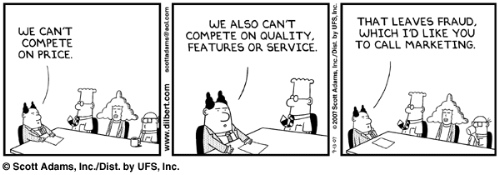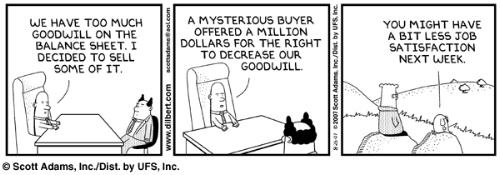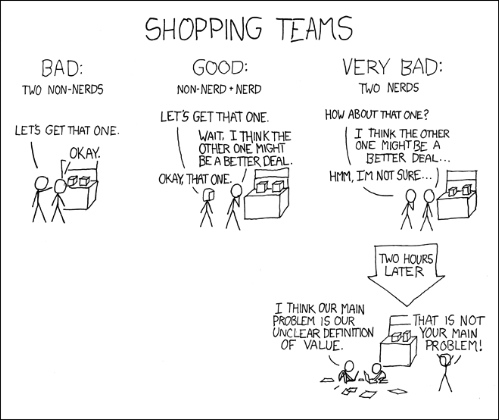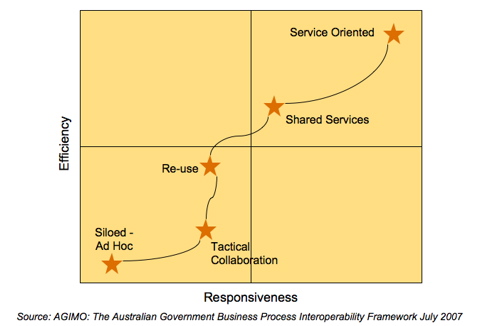Sep 14
Learning Lessons, Building Confidence
If you’d like to see what a wonderful after action review looks like, visit the Office 2.0 conference AAR by Ishmael Ghalimi. Honesty inspires confidence and is – for me at least – the best marketing in the world. This is a conference I’d love to attend.
Just by way of counterpoint, this from Dilbert yesterday:

Sep 12
Don’t Set Policies For Behaviours You Can’t See
The title of today’s post was inspired by this cartoon from Randall Munroe.

Sep 11
Building Expertise in Knowledge Management
Gary Klein is currently guest blogging over at Cognitive Edge, and has a great post today on how knowledge managers can build expertise (arising out of a discussion over the last week).
For those who are interested, iKMS will be picking up the theme of competency development for knowledge managers at our annual conference on 1st November. And we have a live survey right now to find out how organisations invest in KM competency development. Do take part.
Sep 10
How to Uninstall Knowledge Management
The indefatigable Dr David Vaine has another pragmatic podcast for the jaded knowledge manager. Enjoy.
Sep 08
What Would a Knowledge Sharing Policy Look Like?
When you want to introduce new information or knowledge management practices and habits in an organisation, it’s usually a good idea to make sure that your organisation’s policies reflect the things you want to happen. This doesn’t mean that the policies do the work of implementation and change management for you (ie you can’t just issue a policy and then sit back and wait for magic to happen), but they support it by capturing (hopefully) in concise language what you’d like to happen, so that everybody is operating from the same point of view. With Marita Keenan last year, I co-authored a guide to knowledge and information management policy development.
We always recommend to our clients who are developing or revising their information and knowledge management related policies to go out and look for examples of good practice on the internet. There are lots of them out there, especially in public sector organisations hailing from Canada, Australia and the UK. The examples will give you good ideas, and if you look at a few you’ll get a sense of all the different factors to consider.
Some months back one of our clients came back to us to say they were developing an information sharing policy and hadn’t been able to find any such examples. On searching for exemplars myself, including via the actKM public forum, I realised that there is very little concrete and specific guidance on knowledge and information sharing behaviours - which is strange, I find. Most of the material out there is either issuing generic feel-good statements saying that sharing is good and a policy should be developed, or stipulating the conditions in which information should not be shared ie as a disguised information security policy. So I sat down to write a draft version myself.
Sep 08
How to Use KPIs in Knowledge Management
I’ve always been wary of KPIs in knowledge management, because they appeal to a tangible measurement mindset that is easily distracted from the intangible and hard-to-pin down outcomes of KM efforts. I can’t tell you how may implementations I’ve seen where the measurements are diligently gathered and presented as tokens of success (number of documents, number of contributions, number of sharing sessions) when behind the metrics facade, the KM culture and rich sharing habits are as dead as a doornail.
But KPIs, used intelligently alongside “softer” evaluation techniques, do enable you to monitor progress and health in relation to your expectations as you move along your KM journey. And changes or spikes in activity or output trends can signal a need to investigate deeper. So if you take the KPIs with a big pinch of salt and remember you always have to interpret them, they can be a perfectly legitimate tool. So I sat down and wrote this guide to using KPIs.
The paper is in three sections: the first sets out some guidelines for how to use KPIs smartly. The second section gives ideas for sample sets of KPIs covering KM activities and tools as diverse as communities of practice, KM roles, and use of wikis and blogs. The third section is a template for drawing up your own sets of KPIs. The document is in Word format so you can cut and paste whatever takes your fancy (please acknowledge your source). A last word of caution: if you take the whole set of KPIs in this document, you’re taking too many! Leave some time and effort to actually do the work you’re trying to monitor.
Sep 03
Sex and Love and Knowledge Management
Last night, on the plane to Kuala Lumpur, I watched a TED Talk video of the incomparable Helen Fisher (on my iPod). She was talking about the biology of romantic love. In the video she describes three basic brain systems relating to love: Sexual Desire, Romantic Love, and Attachment. Here’s her summary of the evolutionary impact of each:
“The sex drive evolved to get you out there looking for a whole range of partners… romantic love evolved to enable you to focus your mating energy on just one individual at a time thereby conserving mating time and energy, and I think that attachment, the third brain system, evolved to enable you to tolerate this human being at least long enough to raise a child together as a team.”
Today I was in a KM workshop and was thinking that KM implementations seem to fall into roughly two types: initiatives that revolve around analytically-derived KM Frameworks that are imported to an organisation, and that the organisation seeks to conform to – or implement elements of. That’s KM. And the second type is the initiative that seeks to build an organic KM strategy based on the organisation’s own self-understanding as a knowledge-using organisation, and a clear sense of its business goals and priorities. That’s the kind of KM approach that we advocate, and we do so because we think it’s the one that is most likely to get the organisation motivated. But what’s wrong with the Framework approach?
Thinking in one of those bizarre cross-wire moments, it suddenly struck me that KM Frameworks work very much like “attachment-love” mechanisms. They are the long term, failure-tolerant mechanisms that sustain the KM energy of an organisation. The organic KM strategy-building approach is much more like romantic love – it’s the mechanism that drives you to create an attachment, by getting you to focus on just a few things (and in truth probably over-value them for a time) – but for just long enough to allow an attachment to develop. So that fits my hunch and observation that Framework-based initiatives can drift very easily. The organisation finds itself in an arranged marriage without having fallen in love first (which doesn’t always fail, but isn’t ideal).
What I haven’t quite figured out is what the equivalent of Desire is in this theory of KM (though I have spoken about Lust here). Any ideas, anyone?
Aug 31
They Are Stealing Our Language Now
From Anecdote today:
“Just a warning to everyone out there who is using the term “Yellow Pages” to describe the people directories you might develop to implement knowledge management. Today I received this letter from Telstra’s lawyers telling me that I have probably unintentionally infringed their trademark and I must remove the reference from one of our whitepapers. I will make the changes they request, as it is not a biggie, but you should be aware if you are using this terminology that you might have Telstra’s lawyers knocking at your door.”
I checked. It’s not April First, so presumably this is serious. The funniest part of this letter (which is otherwise very sad and mean) is para 7: “As a result of the widespread distribution and extensive advertising associated with the Yellow Pages@ directories, our clients have developed a substantial and valuable reputation and goodwill in the Yellow Pages@ brands.”
Yeah right. Telstra clearly doesn’t understand goodwill, or they’ve been reading too much Dilbert. How much damage does reinforcement of the language into common terminology by respectable and reputable knowledge managers actually do to a brand, as compared with a mean, nasty grasping little letter like this? When Hoover became a verb, the brand did well out of it. Next time I’m in Oz, I’m staying off the Telstra networks. And whose language is this anyway?

Aug 29
On Staying Grounded
I’ve been getting irritated by the apparently pathological aversion to talking about real life cases on actKM. It’s annoying because the aversion allows demagogues to posture and make facile but grand-sounding declamations with no test of substance behind them, and to argue incessantly about the meanings of each others’ words.
In a post to the forum I referred to Jonathan Swift’s account of the flying island of Laputa (Gulliver’s third voyage), where the inhabitants were so obsessed by theory and so impractical that they relied for their supplies on the countries beneath them (whom they threatened with large rocks if they didn’t comply), and employed servants with leather balloons to gave them a whack over the head whenever their abstractions put them in imminent peril – as we see in this classic Arthur Rackham illustration.

So I couldn’t resist this cartoon from Randall Munroe this morning:

And yes, I know this is my fourth blog post today. And yes, I am procrastinating from something more serious. And yes, I am considering a line of leather balloon manufacture for knowledge management forums and conferences.
Aug 29
On Not Forgetting the Business

I like this framework. It comes from AGIMO’s new guide The Australian Government Business Process Interoperability Framework which was launched at the IIM conference a couple of weeks ago. AGIMO is the Australian Government’s Information Management Office (read Government CIO’s office) which is odd, because the guide has been out since July and still isn’t published in electronic form on AGIMO’s website (and the site search sucks by the way). So much for the digital economy. Here’s the ISBN if you want to order an old world copy: 192118244X.
It’s a maturity framework, evidently. And it looks like it could work as a KM framework, doesn’t it, especially in that low efficiency, low effectiveness quadrant down at the bottom left? It’s actually intended to be a framework for moving towards joined-up government, to help agencies align their business processes in the direction of better, more integrated and more coherent citizen services. To this end it’s a very useful resource, with maturity indicators to help you plot your progress and set pragmatic goals (though the case studies are a bit thin) and for some weird reason (remember it’s an information management agency) information management doesn’t figure in the indicators.
I liked it because it works for me within an organisation as well as between organisations (which is what it was originally intended for). It’s a framework for mapping the coordination ability of an organisation, especially a large one. Coordination has all sorts of organisational effectiveness implications, such as cost of repetition and re-work, mistakes big and small in failures to hand-off work successfully, inconsistent information provision and treatment of customers and stakeholders, and so on. The issues of joined-up government are only marginally different from the issues of joined up large enterprises. Coordination effectiveness can bestow critical competitive advantage and its lack can lead to devastating failure.
So often in knowledge management we get wrapped up in KM frameworks and KM processes and KM stuff. We are so preoccupied with building and explaining frameworks about knowledge creation, knowledge transfer and knowledge utilisation, that we forget this is all supposed to be happening for a reason. KM (and IM) are supposed to be at the service of the business. And that’s why I liked this framework, because it looks at one of the critical things that an organisation needs to do in order to be effective, and it allows you to figure out the KM and IM implications supporting that. So AGIMO, despite your slowness, your antiquated processes and apparent IM blindness, I thank you for this.

